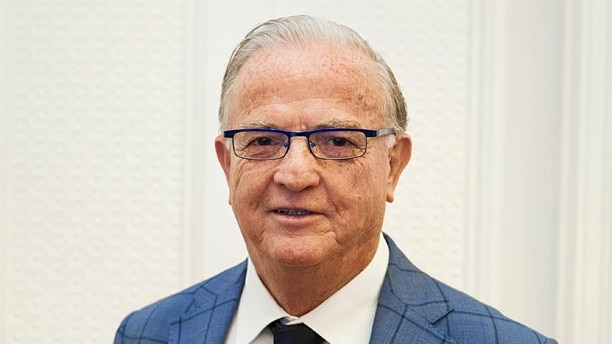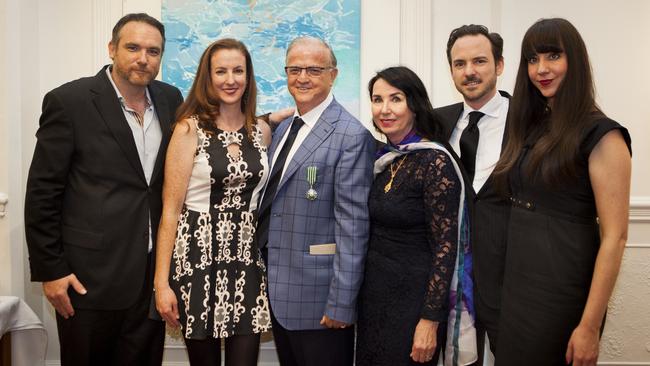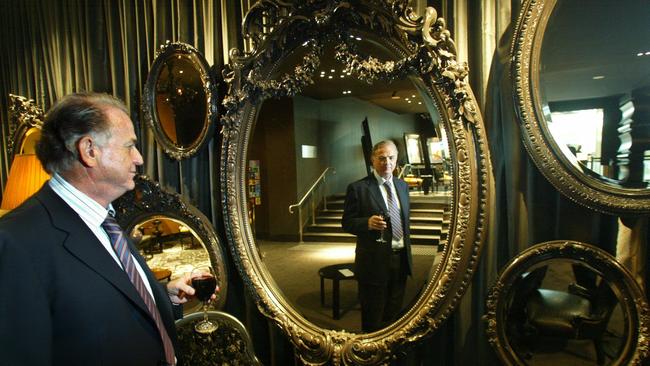Palace Cinemas founder Antonio Zeccola’s great escape to Venice
Antonio Zeccola has shaped Australia’s arthouse film culture for 50 years. And even a pandemic can’t stop him.

Antonio Zeccola is sitting in the garden of the picturesque Albergo Quattro Fontane in Venice sipping a gin and tonic and sporting a mischievous smile as he leans in to tell me how he broke free from lockdown Melbourne. “I was determined to come to Venice irrespective of the coronavirus and the danger of travelling at my age,” he says. Let’s call it Antonio’s great escape.
The 77-year-old founder of Palace Cinemas, which has screens in 24 locations from Melbourne to Brisbane, Sydney, Byron Bay, Canberra and Perth, has been coming to the Venice Film Festival for decades. In previous years as journalists waited in film queues Zeccola, one of the most powerful men in Australian arthouse cinema, would hand out grapes or his favourite Italian biscuits, clearly relishing the festival atmosphere and the air of expectation around world premieres. This year, despite a vastly changed world in which cinemas are operating at reduced capacity, if at all, Zeccola felt he had to return.
“I got my PA to write my application [to leave Australia] and quite frankly everyone in my office and in my own family didn’t think I was going to get the permit to leave,” he says. He could qualify for an exemption if his travel was essential for his business. Equally, he noted that his trip was in the national interest – the business that is done at these festivals will keep his cinemas stocked with films for movie-loving Australians to enjoy.
“I thought I’d just send the application and say that I have to come here for the three markets, in Venice, San Sebastian and MIA [film and TV market] in Rome. Since Cannes didn’t happen this year it was important for me to participate in these markets/festivals so we can stock up on films for the 2021 festivals that we have in Australia,” he says, referring to the French, Italian, Spanish, German, Scandinavian and the upcoming British event. “There are around 150 films that we select for our various festivals in a normal year.”
Conceding that many applicants had failed to gain a travel permit despite pressing family concerns to visit a dying relative or attend a wedding, Zeccola says he went ahead and booked his flights and hoped for the best, knowing he would have to quarantine for 14 days upon arrival in Rome in August. About a week later he received a letter permitting him to leave. “It was surprising to all and sundry in Australia,” he says. “Probably whoever went through the applications could have been a Palace Movie Club member, they could have been a film lover, they could have been a person who understood the necessity for me to be part of these markets. It was a pleasant surprise. I can do my job, I can do my work.”
And he could have his annual pilgrimage to his homeland? “Australia’s my homeland as well.” Your birthland then. “My birthland that I love.”
He can’t help comparing Italy with Melbourne, which is under full lockdown when we meet in Venice. “The restaurants are open here, the social distancing works, there are masks but there’s life also. There are no curfews, there’s no real serious impediment to running your day-to-day life as there is in Melbourne.”
I then catch up with his son Benjamin on the phone, and the image of a CEO running the family business at home surrounded by his kids puts the Melbourne crisis in stark contrast to his father’s freedom. In 2013 Zeccola, by then officially the Palace chairman, handed over the role of CEO to his second son. “It’s exhausting,” Benjamin, 46, tells me. “Luca! Sit at the table!” he yells to his 14-year-old son. “It feels like week 156 of home schooling.” He says his daughter Chloe, 11, is “terrific and self-motivated” while Chiara is “a typical eight-year-old”. He has his computer set up on the dining room table so he can supervise schoolwork. “I probably stop my work every eight minutes to put him back on track.”
Benjamin handles the day-to-day running of the business with the help of his brother Antony, 49, who works out of Sydney in business development; his Melbourne-based sister Elysia, 42, oversees festivals, and Stephanie, 40, is the national marketing manager. (Their mother, Antonio’s adored wife Karen, remains in Melbourne. “Karen didn’t come because it would have been too complicated with Covid,” Antonio says.)

While life in Melbourne – where Palace has eight cinemas – has been “miserable”, Benjamin hopes the tide is turning as case numbers improve. In the other states cinemas remain open, with social distancing ensuring a reduced capacity. “Week by week we’re 80 per cent down on our usual trade, so this is a particularly stressful and challenging time for us,” he says. One of their venues, Cinema Paradiso in Perth, which was named after Giuseppe Tornatore’s 1988 Oscar winner, has closed permanently. Palace has been able to access JobKeeper for its staff, but has been excluded from other stimulus measures based on the thresholds, Benjamin explains, referring to its annual turnover of over $50 million. “Due to social distancing requirements and the costs associated with it, borrowing is inevitable as a bridge to reach the other side of the chasm.”
Meanwhile, at the downscaled Venice event in September, cinemas were running at 50 per cent capacity and guests were subjected to temperature checks and wore masks. Zeccola watched five to six films a day and wearing a mask didn’t bother him. “I got used to it from the first frame,” he says. “I think it’s because you are eager to see what the film is about. If there is a story to follow you don’t even realise you are wearing a mask.”
While there, Zeccola received an award “for Italian excellence in the world” from #InTaste Eventi, which deals with culture and food. He has previously been bestowed with the Cavaliere by the Republic of Italy and the Order of Arts and Letters (Chevalier de l’Ordre des Arts et des Lettres) for his services to French cinema. “I was taken by surprise,” he recalls of his latest accolade, noting awards were also given to a musician, a painter, a writer, chefs including “a professor of pizza-making” and artists. What did he say in his acceptance speech? “I can’t really remember, but the fact that I had built a unique business in a very tough industry was the guts of it. I always have trouble and become embarrassed when I have to talk about myself.” Zeccola likes to talk even less about himself in English, as his Italian accent remains strong. “The language barrier has been a challenge for him to overcome throughout his whole lifetime,” says Benjamin.

After the Venice film festival, Zeccola emails me:“Hi Helen, I am in the south of Italy, pretty safe, in the town where I was born which has had NO COVID at all, ever!!!”
Zeccola grew up in Muro Lucano, near Naples. His father, Giovanni, was a cabinet-maker who used to catch the train to Rome and return with huge film reels under each arm so he could screen them in the local church hall. He immigrated to Australia in 1956. “Around three to four years earlier he had tried Brazil but saw no future for us there,” Antonio recalls. “An uncle of ours had been a prisoner of war in Australia and recommended it. So he went. He would have been in his mid-40s. Fancy deciding to pack it all in in Italy and travel to a very faraway land! He had to do it because he saw no future in the south of Italy for us at the time.” There were two ways to come to Australia at the time, he explains: via assisted passage, with a long waiting list and at a cost of £25 per person; or by paying your own way. “What my brilliant father did, and only God knows how, he convinced the Commonwealth Bank to lend him £2000! So that would pay for the passage of the seven of us. In October 1957 I arrived in Australia. I was 14. It wasn’t easy,” the incurable romantic notes, “as I had left behind my girlfriend, Mariolina de Meo.
“We didn’t ask for any money like the rest of the migrants at the time. We just got stuck into hard work. With no English and the difficult age I was at, I was too old to go to school. I did go for three months, but it was rather embarrassing. In Italy I had studied Latin and Greek, apart from all the other subjects, and I was good at maths. But in Australia I was in year three and at the back of the class, not really knowing what was going on.”
Instead Antonio, with his father and his brother Franco, rented a cinema in Melbourne’s north and showed Italian-language films. The venture failed. Undeterred, Antonio would eventually find a niche with the single-screen cinema, which provides the kind of familial atmosphere he enjoys. Palace Cinemas was born in 1970 when he rented the Roma and Metro cinemas in Melbourne.
“He was always intently focused on the goal he wanted to achieve,” says Benjamin. “That goal usually manifested itself as opening a cinema and people would say, ‘You’re crazy, you don’t do that’ and he would do it anyway. That’s how places like the Balwyn cinema were hired. It was abandoned by Village Cinemas because they thought it was all about malls and shopping centres and that the suburban single screen cinema was dead. The Dendy Brighton was the same and he went in and took a big risk in stepping up to pay the rent and Palace grew that way. So financially he would always take these big stretches and then work at them until they succeeded.”
The European sensibility infuses all things Palace. Three years ago, when the Goethe-Institut found it uneconomic to continue with the German Film Festival in Australia, Palace took the event under its wing. “The German Film Festival simply would have disappeared,” Benjamin says. “It took quite a bit of doing, but it’s our calling, isn’t it? Not every festival is as financially rewarding as we’d like it to be, but we just love sharing great movies. I think that’s what drives us.”
Meanwhile, Zeccola is enjoying his time in the sun in Europe, reaping the rewards of a life he has dedicated to cinema, and to his family. He was buoyed by the new releases in Venice, nominating The Duke, a real-life yarn about a 1961 art thief starring Jim Broadbent, as a standout. “This was a good year for quality films and there was more space for independent films,” he says. He also nominates Regina King’s directing debut One Night in Miami, about four distinguished figures including Malcolm X and Cassius Clay discussing civil rights, and the ultimate Golden Lion winner, Nomadland starring Frances McDormand. He hopes the latter film will play in his cinemas as well.
He is currently in Rome attending the festival and market and preparing to return home with a clutch of films under his belt. “I started to work at 14 years of age and I’m still working,” he says. “I’m now the same age as the Venice Film Festival.”

To join the conversation, please log in. Don't have an account? Register
Join the conversation, you are commenting as Logout